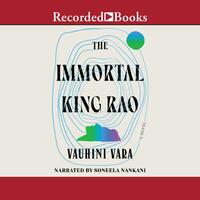You need to sign in or sign up before continuing.
Take a photo of a barcode or cover
challenging
mysterious
reflective
slow-paced
Plot or Character Driven:
A mix
Strong character development:
Yes
Loveable characters:
Complicated
Diverse cast of characters:
Yes
Flaws of characters a main focus:
Complicated
I had never heard of this one, had no idea what it was about, when I saw it as one of the free ARCs that the library sometimes receives, out on the break table as a first come, first served situation. The title intrigued me, so I looked up a quick blurb, and it caught my fancy enough for me to decide to give it a go. (Fun side story: I was taking the book photo for this one while at a bar and, while my friends/partner usually make fun of me and yelling “nerd” when I do that, this time completely strangers were giggling and asking me if this was “for proof that I actually read the book.” My coolness vibe grows on the daily, y’all. Haha.)
King Rao is born in the 1950s in rural India, growing up on a coconut farm run by his Dalit family. Through luck and passion and the randomness of fate, King Rao becomes the CEO of the largest tech firm in the world, later ascending to be the leader of the “Board,” the corporate-like ruling body of a speculative near-future. Athena is King Rao’s daughter, having been raised by him alone after his fall from grace, she runs away and joins a group of dissenters, where she struggles to come to terms with the man who raised her and the legacy he’s left on the world.
This is a speculative novel unlike any I have read before. It took the tech revolution of the 80s and charted a course of progress so similar to our present day that it’s almost hard to tell a difference, while adding a few key elements that make the world Athena is left with *just* different enough from ours to be considered dystopian. (Though, an important point here, is that with how familiar it feels, perhaps we need to examine the borderline dystopia were actually have…) Reading that the author is a former tech reporter for the Wall Street Journal honestly comes as no surprise, based on the plot and events of this book. She has a keen eye for historical/contemporary patterns and sector interweaving (climate change, social justice, tech advancements, bodily autonomy/land rights, corporate oversight/power to name a few), which I can only assume is due to her journalism background, and it’s incredibly impressive in its depth and breadth.
As far as the writing itself, it’s an interesting and unique narrative voice: King Rao’s child, Athena. Some of it is her own experiences and reflections, but it’s mixed in with her father’s story. And not just the story he told her of his life, as would be the case for most child narrators, but rather (due to the sci-fi tech aspects) in her interpretation of the events he actually experienced, as he was able to pass his exact memories on to her directly. It bounces between storytelling of King Rao’s past and Athena’s own recent experiences, and her current reflections on her incarceration situation. There is a considerable monologue-style, along with direct addressing of commentary to the reader as well. It honestly took me some time to get into the flow of the story, to understand who the MC is, at what point during the unfolding of events (past or further past or present) we are, and to acclimatize to the speculative but deeply familiar present/close future world that is the setting (especially the tech/biotech, as it uses terminology and theory based in reality, but takes it all a step further than we are currently at, in a classic sci-fi way). It was good and by the end I appreciated what Vara was had created, but it was also dense and slightly difficult going for a while. I was glad to have gotten the audiobook from the library to help me through it.
As I said, Vara managed to include quite a few themes and hot topics in this novel, in a way that could have felt like too much, if not for the smooth way she pulled all the patterns and pieces together so that nothing was lost. This tale of King Rao, an interwoven story of a young Dalit/untouchable child growing up in his homeland, his journey to America to study and make something bigger for himself, and the eventuality that he went so big that perhaps it was too far, was sweeping and ambitious, but for the most part, successful. There was great insight into the reality of shallow living and dissatisfaction of late stage capitalism, and how we have (and are in danger of bringing ourselves down completely by continuing to) gaslighted ourselves into believing it that we’re fine within that framework, both personally and as a wider society. Vara’s exemplification of the [potential] dangers of too much private sector replacing government, because their financing and infrastructure is better, in lieu of investing in better government funding is very affecting.
Finally, though I have to say I am not totally sure how the ending was meant to be interpreted (it felt open and malleable similarly to El Akkad’s What Strange Paradise), I thought the closing paragraphs were an epic interrogation of all our grasps at immortality and deeper purpose was great. Vara explicitly questions whether anything means more than itself, whether, in fact, there is no nothing past the surface and our search for legacy will always end empty.
This was such a smart story, with complex and nuanced layers, and as I’ve said, a really singular take of technological speculative fiction. I really want to say that it’s an important cautionary tale, but for the fact that it seemed so real/likely that it moved past cautionary future into the realm of present (slightly distorted) reflection...like the glass in old windows. A fascinating read, though one that does require effort from the reader to keep up with.
“The best anyone can do is to put enough goodness into the world to make up for the badness you've put into it.”
“That is to say, our extraordinariness has to do with what we've accomplished together; our defining characteristic is being able to pass something of our lived experience from one human to another, thus ensuring our advancement as a species.”
“Existence is change.”
“There is a kind of action that resembles inaction, and it is the kind on which all of society is founded.”
“Our people have become so excellent at conquering that we have succeeded in conquering even ourselves. Time's up.”
Graphic: Classism
Moderate: Ableism, Confinement, Death, Racism, Toxic relationship, Violence, Religious bigotry, Death of parent, Injury/Injury detail
Minor: Domestic abuse, Terminal illness, Blood, Police brutality, Medical content, Murder, Pregnancy, Fire/Fire injury
emotional
reflective
medium-paced
Plot or Character Driven:
A mix
Strong character development:
Yes
Loveable characters:
Complicated
Diverse cast of characters:
Yes
adventurous
emotional
tense
medium-paced
Plot or Character Driven:
Plot
Strong character development:
No
Loveable characters:
Yes
Diverse cast of characters:
Yes
Flaws of characters a main focus:
Yes
A sprawling multigenerational story center on King Rao, the favorite child in a huge clan of Dalit coconut farmers, he goes on to invent the Coconut (an analog to the iMac) and changes the world into a corporatist shareholder government. The novel switches between his family history and the story of his daughter, Athena, all told from her point of view.
Events unfolds slowly and carefully and the jumps in POV and time help unwind it. We jump from the world of Rao’s mother, her sister, her husband, and his brother; the politics and family scandals and history of how the Dalit Raos came to own a coconut farm; Rao’s young adult years studying in America; Rao’s rise to fame and the creation of a dystopian shareholder government run on algorithms and a currency of social capital.
But all that is nested in the story of Athena, whose world unravels when she is framed for her father’s death.
Twists and turns, reveals, history, social commentary that can be heavy but not unbearably so, at least for me, a heavy dose of satire, tight, beautiful prose. The book wasn’t an unadulterated dub for me, but I loved it, warts and all.
Minor: Sexual content, Sexual violence
slow-paced
Plot or Character Driven:
A mix
Strong character development:
No
Loveable characters:
No
Diverse cast of characters:
Yes
Flaws of characters a main focus:
Yes
challenging
dark
reflective
slow-paced
Plot or Character Driven:
Plot
Strong character development:
Complicated
Loveable characters:
Complicated
Diverse cast of characters:
Yes
Flaws of characters a main focus:
Complicated
challenging
dark
reflective
medium-paced
Plot or Character Driven:
A mix
Some interesting ideas in this book, but I bounced off it pretty hard. I think it was going for the satire approach, but it just didn't land for me.
adventurous
challenging
dark
emotional
mysterious
reflective
medium-paced
Plot or Character Driven:
Character
Strong character development:
Complicated
Loveable characters:
Complicated
Diverse cast of characters:
Yes
Flaws of characters a main focus:
Yes
We jump back and forth between three timelines of the life of King Rao, tech genius. Dystopian future that seems eerily close to what could happen IRL. Commentary on tech companies, social media, caste system, climate change.
Moderate: Death, Violence, Death of parent, Murder
Minor: Sexual content
A near future dystopia that is way to near. I'm with the Xs.
adventurous
challenging
reflective
medium-paced
Plot or Character Driven:
Plot
Strong character development:
Yes
Loveable characters:
Complicated
Diverse cast of characters:
Yes
Flaws of characters a main focus:
Yes
In some ways this felt like a novelization of The Outer Worlds, hitting many of the main themes of that game. I never really got a feel for the title character, and nothing here struck me as original or newly thought-provoking. But the writing was good, and maybe I would have liked it more if I hadn't read it on the heels of playing the game.





